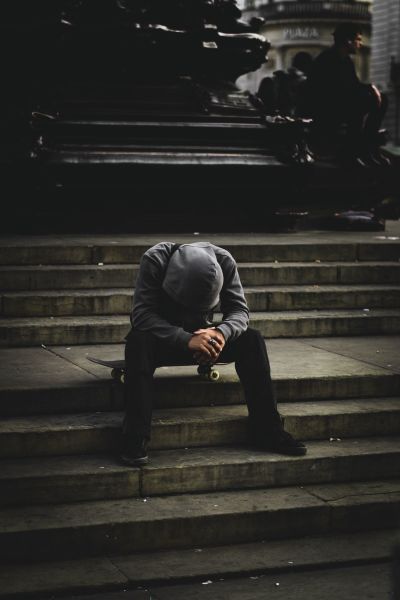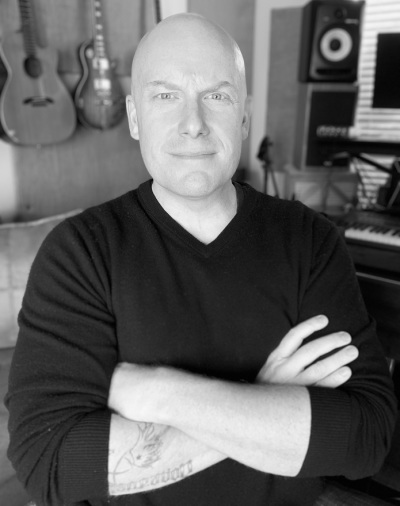Worship leader Scott Box shares how faith is helping him beat bipolar disorder in book ‘Heroic Disgrace’

In the foreword to worship leader Scott Box's new book, Heroic Disgrace, his cousin, Brian "Head" Welch, who co-founded the Grammy Award-winning band Korn, calls it "one of the best stories I've read in a long time."
"Heroic Disgrace is truly a remarkable story about one man's fight to find authentic freedom. I am extremely confident that this book will change many lives. It's one of the best stories I've read in a long time. And I'm not just saying that because Scott Box is my cousin," wrote Welch, who previously shared his own story about deliverance from drug addiction in his New York Times best-selling book Save Me From Myself.
And the book, which chronicles Box's struggle with bipolar II disorder and his eventual triumph in bringing it under control with faith, medication, his family, and a talented team of Christian health professionals, lived up to the family hype.
Indeed, Heroic Disgrace is perhaps one of the most refreshing and illuminating accounts of a Christian wrestling with their mental health I've ever read. It's an important one because the Church still struggles to have honest conversations about mental health, which still carries a stigma among people of faith.
Box bravely tells his story in vivid chapters of word pictures that are likely to resonate with individuals trying to reconcile their faith with their mental health struggles. The ministry's founder, Worship Hero, aims to change the way people understand and practice worship by providing tools to "Pursue Jesus." He says he doesn't worry too much about being stigmatized because of his bipolar II diagnosis.
"My pain has become my purpose. That might be a cliché, but my pain is my purpose. My heroic lifestyle is my witness. I don't care if it sounds too lofty. I don't care if it strikes some people the wrong way. I'm a dude. I'm a man who wants to live as a freaking stud, who wants to be who God created me to be," Box explained to The Christian Post in a recent interview from Central Oregon.
"The reality is I know that I live in a broken, fallen, sinful world, and this life was not supposed to be easy. So my pain is really my purpose, and I accept that. I get that straight from Jesus. His pain was His purpose. I'm just modeling myself after my Savior, who is by the way, the great hero," he said. "This is easy stuff for me. This is fundamental stuff that I feel like the Church has lost its way on. And I want to be able to guide people with my lifestyle, so my pain has become my purpose."
Studies show many churches are ill-equipped to minister to Christians who struggle with mental illness, and thousands who were once among the faithful have shared how they had to flee churches that tended to merely spiritualize their suffering instead of helping them find medical help where appropriate.

When Perry Noble, founder of NewSpring Church in South Carolina, revealed in 2014 that he started taking anti-depressants in 2012 after years of struggling with anxiety and suicidal thoughts. his confession caused quite a stir.
Noble was eventually fired from his senior pastor role at the Church in 2016 for alcohol abuse and other "unfortunate choices and decisions." He wrote about his evolution in treating his mental illness in a blog titled, "Should Christians Take Medication for Mental Illness?"
The Church has also witnessed very public and tragic ends for several Christian leaders who struggled with mental illness such as Jarrid Wilson, who was an associate pastor at Harvest Christian Fellowship in Riverside, California; former Inland Hills Church Lead Pastor Andrew Stoecklein; and Jim Howard, another California pastor who took his life in 2019 after he stopped taking his medication during a private struggle with his mental health.
A WebMD report on bipolar II disorder says it's similar to bipolar I disorder, with moods cycling between high and low over time. The difference with bipolar II disorder is that the "up" moods never reach full-blown mania. The report explains that the "less-intense elevated moods in bipolar II disorder are called hypomanic episodes, or hypomania."
"On the emotional scale between the most profound depression and most crazy mania, there was a hypomanic segment of emotional existence I could slide into from time to time," Box wrote in Heroic Disgrace of the particular emotional state. "It existed in the artificial paradise below irritation and agitation. I suppose I could describe it as living an entire day — maybe an entire week or more — in the moment of excitement, anticipation, and glee of Christmas Eve or Christmas morning as an innocent child."
Individuals diagnosed with bipolar II disorder have had at least one hypomanic episode. Most also suffer more often from episodes of depression, but they can generally live normal lives.
In his journey of discovery before his diagnosis in his twenties, Box shared how the disease drove him toward unhealthy addictions to things like food, pornography and alcohol that challenged his marriage to his wife, Kariann.
With the help of his medical team, both Box and his wife were forced to grieve what they lost in the challenge posed by bipolar II and find a way to health.
"I had been self-medicating with everything from food, alcohol, pornography. I mean, I was; there was a lot of self-loathing that was engaged which that pit of self-loathing," he said.
"You have to remember, too, I was grieving not only my marriage component, but I was grieving ministry. The sense of moral authority was lost. I felt that I had lost not just because of my sinful things or my broken things but because of my broken thing. My mental health," he explained.
"Did I have a leg to stand on anymore as a church leader? I didn't know. Nobody really wanted to talk about it outside of the counseling office. Of course, Kariann and I [did], but the Church didn't want to talk about it … I felt like a fraud."
Box revealed that his addiction to food at one point was so bad his weight ballooned to nearly 300 pounds.
"We talk about comfort food all the time, and that's a real thing. I think one of the greatest challenges that the Church has, and as individuals, we have maybe just as believers, is we don't think of ourselves just as the whole person. In other words, we don't think of ourselves as mind, body, and spirit. For some reason, we've forgotten that, and so our most base level of desires it will tripwire the higher levels of who we are and so we short-circuit. And so it's like, hell, I'll just eat more," Box said.
"I speak not in general. I don't mean to be general with that. I need to be very specific with that," he said.
"That's what was happening in my life. I wasn't thinking of myself as a whole person. I was considering what my base desires were, what my cravings were, and I was feeding those cravings. As somebody who is bipolar, that's a very dangerous practice. It's a very dangerous habit because that type of lifestyle feeds the monster. It feeds the hypomanic ups, and obviously, every time you go up, there will always be a crash. So when you're feeding that with sugar, you're chemically inducing the highs and the lows because you can't manage your own lifestyle, you can't manage yourself as a whole person."
When asked why he chose to write such a personal book about his struggle with bipolar disorder II when mental health remains a taboo subject in the Christian community, Box said: "I knew I had to tell my story."
"I knew that I had grown up in a family that wanted to matter. I wanted the heroic. There was that heroic theme running through my life. My problem was everything I thought about heroism wasn't Jesus' kind of heroism.
"It was Scott Box's heroism that led me down a very twisted and tangled road of misunderstanding. And then you throw in the fact that I was a worship leader for years, then you throw on top of that, the aspect of mental illness and bipolar disorder; I knew I had to tell my story. I just knew I had to tell it," he said.
"For me, those things are compelling enough, but there were those three threads … put on top of that the fact that we were going through COVID and the Church has struggled with the conversation on mental health, it was an easy decision. I had to tell my story," he added.
Preliminary new data published on Wednesday by the Centers for Disease Control and Prevention showed that deaths from drug overdoses reached a record-breaking number of some 108,000 in 2021, pointing to a worsening fentanyl crisis and what some experts have previously addressed as a symptom of mental distress amid the ongoing COVID-19 pandemic.
When the news was highlighted to Box during his interview, knowing what he knows now about how mental health can be properly managed with the right medical and spiritual support, he called the alarming overdoses "unnecessary."
"That's what's so freaking messed up about this. It's unnecessary, and yet, we (the culture) doesn't have an answer. So this is why Christians in the Church have to figure their crap out. You can quote me on that," he chuckled.
He praised Welch for writing the book's foreword, which took him two years to complete from conception to publication, and how it helped to bring them together as cousins.
"I was being very honest in that book when I talked about Brian because for many years, Brian and I knew each other existed, but we didn't know each other. But this project has given us the opportunity for God to redeem the time and the relationship that we just didn't have," Box said.
"He's an amazing man. I don't say that because he's my cousin, but God has changed Brian. It's his story to tell and all of that, but to see the generosity and the kindness that Brian Welch has for not just me, not just because I'm family, but for everybody that he interacts with in his life is pretty special to see Jesus in that guy's life."






















